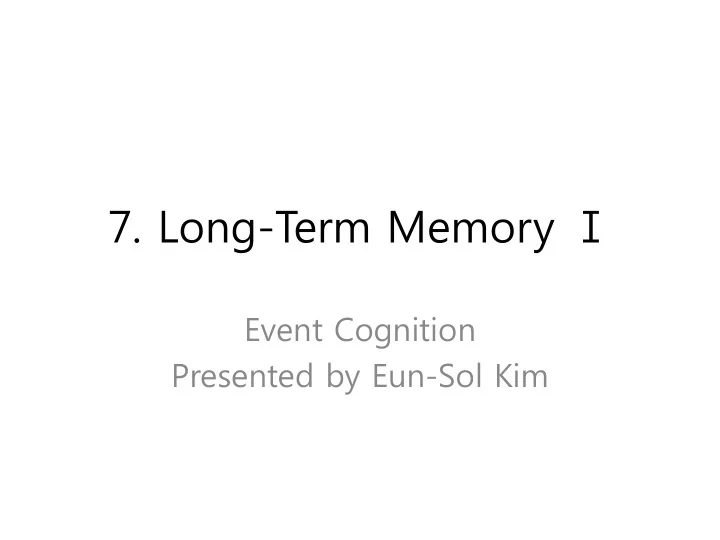

7. Long- Term Memory Ⅰ Event Cognition Presented by Eun-Sol Kim
Index Levels of Representation • Prior Knowledge • Schemas and Scripts – Memory Impairment • Loss of Long-Term Event Model Access – Loss of Access to Event Schemas – Loss of Generalized Memory – Event Segmentation and Memory • Compartmentalization – Event Boundaries are Anchors in Long-Term Memory – The Working Event Model and Memory • Perceptual Details – Integration – Causality and Memory • Causal Structure – Cause and Effect – Noncompetitive Attribute Retrieval • Competitive Event Retrieval • Schemas to Manage Interference – Summary •
Levels of Representation • Three levels of representation of a narrative text – The surface form, textbase, the situation model (mental model) • When people attempt to remember the past, they often depend on representations of events.
Long-term Memory Retrieval • Long-term memory retrieval involves some reconstruction. • Short delays, simple information: reconstructive processes are not to produce distortions of memory • Longer retention intervals, complex information: reconstructive processes are to have a larger influence.
Prior Knowledge • General world knowledge is needed for effective event cognition. • Prior knowledge – Used to determine how events are structured • Structured representations of how recurring events: Schemas and Scripts
Schemas and Scripts • Schema – Knowledge structures that capture the common structure that is consistent across a collection of experiences – Help organize experiences – Having a profound effect on segmentation, causal connectivity, comprehension, memory • Information that is consistent with a currently activated schema is comprehended and remembered better
Prior Knowledge on Long-term Memory • Prior knowledge can influence the encoding of event information into long-term memory • Bransford and Johnson (1972) – Give the readers a passage (constructed to make it difficult to construct a situation model) – “The procedure is actually quite simple. First you arrange things into different groups. Of course, one pile may be sufficient depending on how much there is to do .” – With / Without the title: “Washing Clothes” – This manipulation affects encoding
Two models for event • Event schemas – a form of semantic memory – How classes of events are structured • Event models – a form of episodic memory – Capture the specifics of particular events • Schema-pointer-plus-tag hypothesis • Schema-copy-plus-tag theory – The Author’s view
Memory Impairment • Loss of long-term event model access • Loss of access to event schemas • Loss of generalized memory
Loss of Long-Term Event Model Access People who have amnesia in which they have very poor • memory for specific events that they involved in or learn about Two components: Antero-grade & Retrograde • • R.F.R (McCarthy and Warrington, 1992) – Suffered bilateral medial temporal lobe lesions – Good memory for famous faces, names (semantic) – Difficulty with the names and faces of family and friends (more event-related) – Could not remember events from his own life • Supports two idea s – Autobiographical memories are essentially event models – Generalized information about entities is stored separately from event model.
Loss of Access of Event Schemas • Patients with prefrontal cortex impairment • Errors sorting events in scripts, misordering the events…
Loss of Generalized Memory • K.S., T.R., and M.N. • Examples of the separation of the information about the structure of an event model and other less critical information • K.S. remember event well but lacked the ability to specifically identify the entities involved – K.S.’s semantic knowledge of many concepts intact
Recommend
More recommend